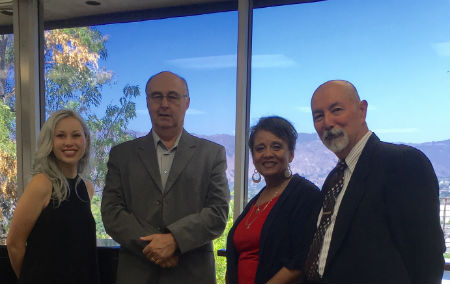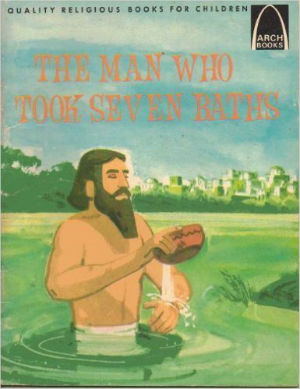Perseverance, Prayer Mark the Christian Life
By Neil Earle
 From left: guest worship leader Brigina Walton, Pastor Neil Earle, worship leader Renita Copeland, and assistant pastor Paul Tellez.
From left: guest worship leader Brigina Walton, Pastor Neil Earle, worship leader Renita Copeland, and assistant pastor Paul Tellez.One of the things we like to do in Glendora church occasionally is to have our local leaders speak to us and relate back their very valuable experiences along the Christian road.
The Bible tells us we are on a pilgrimage with many ups and downs and rough spots along the way. So here are experiences related to us by our worship leader Renita Copeland and elder Paul Tellez from their separate Christian walks.
A Mother’s Passing
Renita shared with us at the very end of her message that it was still a struggle to cope with the death of her mother who died on July 24. This helped frame the tenor of her remarks. “How do we remain positive and forward thinking?’ she asked after explaining from scriptures such as Jeremiah 1:5 that God is aware of very detail of our lives even more than we are and He is not willing that any should perish but inherit eternal life (2 Peter 3:8-9).
Drawing on her ongoing experiences as a third-grade teacher, Renita related how Jesus has developed an IEP (an independent educational program) for each one of us. Philippians 4:6-7 reminds us not to be anxious about anything but look to Him in all things.
So, speaking as a veteran Christian she asserted that God would help her get through this latest trial from the promise in Hebrews 12:1-2 which reminds us that he will never leave us nor forsake us.
As our guest worship leader Brigina Walton intimated at the end of these talks, the sharing of personal trials and experiences is so valuable as we are all members one of another.
 Jeremiah's turbulent ministry still inspires us today.
Jeremiah's turbulent ministry still inspires us today.
Miracles Still Happen!
Paul Tellez spoke next and he picked up on Renita’s ASAP model (Always Say a Prayer) – asking if God still answers prayers. He too quoted Jeremiah showing his name means roughly “Thrown into” or “God hurls.” Jeremiah was the weeping prophet who had to deliver tough messages to his city of Jerusalem (“Jerusalem’s last chance”) and leaned a lot on God in prayer.
James 4 tells us we do not have because we do not ask but we must not see God as a vending machine in the sky. Paul then outlines four factors in how God answers prayer which were very helpful:
1. Direct and Immediate Answers. 17 years ago Paul’s grandson was born wit a hole in his heart and a hematoma on the base of his brain. He came early and had to be delivered with Caesarean section weighing only 2 1/2 pounds. Doctors wanted to disconnect Mark’s life support because he would perhaps be a burden to the family but the family was church-goers who rallied around Mark’s hospital bed linking hands in fervent prayer.
Within two days the hole in Mark’s heart healed and he was on the way to recovery. His lungs were healed and the scar on the base of his brain disappeared. Today Mark is a healthy 17-year old and a handsome young man at that.
2. Delay – Paul reminded us that Jesus delayed the healing of Lazarus (John 11) which turned out to be a dramatic miracle. After church someone mentioned how Abraham and Sarah, fathers of the faithful, had to wait 25 years for son Isaac to be born. “God works on his own time schedule, not ours” added Paul.
 Miracles then and now: Naaman is healed of leprosy by following directions to bathe in the Jordan (2 Kings 5).
Miracles then and now: Naaman is healed of leprosy by following directions to bathe in the Jordan (2 Kings 5).
3. Denial – “God has the freedom to say No,” Paul reminded us. St. Paul was not healed of his thorn in the flesh and Paul Tellez himself was bitterly disappointed when his father died 27 years ago. “I prayed and prayed and prayed and felt God was going to answer me, but the answer this time was No. So God did answer it was just not the answer I wanted.”
Paul gave up praying for a while after that, he confessed, but soon was back on track – the ups and downs in the Christian life.
4. “Different” answers – Paul then spoke on how God will usually answer differently than we think. I was thinking while he spoke, Eye has not seen nor ear heard nor entered into our imaginations the different ways God can work (1 Corinthians 2:9). Paul’s words also reminded me of how in 2 Kings 5, Naaman the brilliant Commander-in-Chief of Syria, but also a leper, was told by the prophet Elisha to wash in the Jordan seven times and Naaman was indignant at this seemingly silly strategy. The general finally relented to the good advice of his servant and – hallelujah! – he was healed of his leprosy.
God truly moves in mysterious way!
“Prayer praises God,” Mr. Tellez concluded,” Prayer honors God and prayer recognizes God in our lives.”
Is anything more important? Thanks, friends, for the timely reminders.